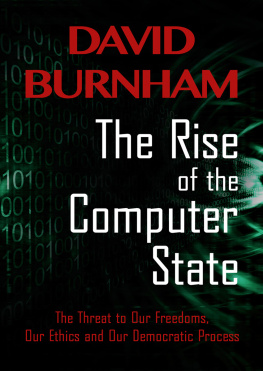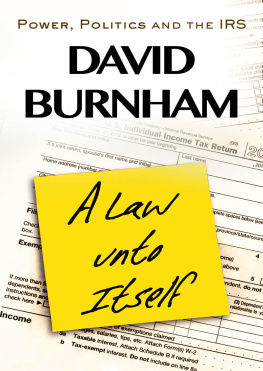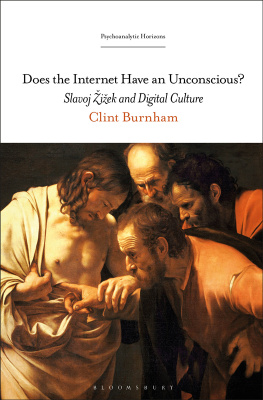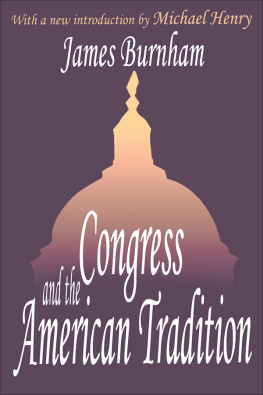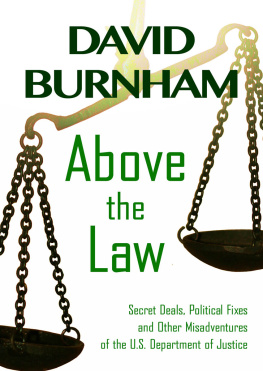The Rise of the Computer State
The Threat to Our Freedoms, Our Ethics and Our Democratic Process
David Burnham
To my daughters, Sarah and Molly
Acknowledgments
To thank all who have assisted me is not possible. Sophy Burnham strongly encouraged me to undertake the wonderful independent adventure of writing this book. Walda Roseman was my first tutor in the many ways that changes in communications technology are affecting every facet of our lives. Marcia MacNaughton remains a constant friend, steadfast supporter and forthright critic. She long has been directly involved in the challenging struggle to understand and tame the forces of the communications revolution. Mae Churchills insights into the workings of the great bureaucracies of our age have provided a constant reminder of the alertness required if we are to maintain the rights and privileges guaranteed by our Constitution. Joanne Omangs buoyant humor and loving good sense are an essential balance.
Fred Friendly and Sanford Jaffe, both with the Ford Foundation; Mary Milton of the Markle Foundation; and Elizabeth McCormack and Wade Greene, representing a member of the Rockefeller family, all offered early, informed and generous support. The Aspen Institute for Humanistic StudiesJoseph Slater, Michael Rice and Steve Stricklandprovided me a happy place to work.
Robert Loomis of Random House constantly offered help and support that was invaluable. From the very beginning of my thinking about this book, my agent Robin Straus has been an extraordinarily good friend and thoughtful advisor.
Contents
The Beginning
My story begins more than a century and a half ago; Napoleon had been dead for one year. James Monroe was the president of the United States. Baby Victoria was fifteen years from assuming her splendid throne. Charles Darwin would not publish his revolutionary thesis On the Origin of Species for another three and a half decades.
The year was 1822. In England a brilliant, cantankerous mathematician named Charles Babbage completed the construction of a model of a technically advanced adding machine that he called the difference engine. The British government, correctly assuming that the special power of this machine could greatly enhance the navigating skills of the worlds leading maritime nation, decided to subsidize the difficult task of building a full-scale version of Babbages device.
This nineteenth-century example of a government-supported research and development program went forward in a laboratory partially built by public funds. Babbages craftsmen, however, found the challenge of building the necessary system of gears and cogs extraordinarily difficult.
Year after year Babbage continued the frustrating task of trying to transform the model of his difference engine into a full-scale reality. But he also began thinking about a far more ambitious invention. The mathematician first wrote about this new device in 1833. Historians now say that this second conception, which Babbage called the analytical engine, was the worlds first universal digital computer.
From the high-technology perspective of the late twentieth century, Babbages two devices look a good deal like each other. A replica of the experimental model of the difference engine at the Smithsonian Institution in Washington looks like the brass innards of a carefully crafted and very sturdy antique clock. Hundreds of brass spools, geared to each other and stacked on a series of metal shafts, rest on a thick oak frame. The drawings of the analytical engine suggest a similar but far more intricate machine.
The apparent similarity, however, is misleading. The model of the difference engine could do nothing but add numbers with complete accuracy. The analytical engine, as conceived by Babbage, was far more ambitious. With it, the operator could place instructions in the machine to later undertake a lengthy series of different mathematical functions. In todays language, the operator could program it. The analytical engine had a memory or store unit, as well as input, arithmetic, control and output units.
Unlike virtually all inventions of the first part of the Industrial Revolution, Babbages second machine was not intended to increase the physical strength and mechanical ability of mankind. Instead, implicit in its plans lay a revolutionary method to examine and organize the universe, to increase the power of the mind. Now, fifteen decades after Babbages fertile brain conceived the analytical engine, both the device itself and the thought processes that emerged from it have come to play a major, perhaps even dominant, role in how people earn their livings, teach their children, elect their leaders, play their games and wage their wars.
The significance of Babbages conceptual achievement was understood by neither the British government nor most of his peers. But it was recognized and celebrated by one of his disciples. Her name was Ada Augusta, the Countess of Lovelace, and she was the brilliant daughter from the brief stormy marriage of Lord and Lady Byron.
Contemporary portraits show Ada to be a slight, beautiful woman with dark romantic eyes, a slim nose and a small, determined mouth. She was known as an excellent horsewoman, and in her later years was a compulsive gambler. There were even rumors, apparently unfounded, that she and her mentor, the brilliant Babbage, once worked together to develop the elusive dream of all gamblers, a sure-fire system to confound the bookies.
Mathematics was the second curious passion of Lady Lovelace, and with expert tutoring from Babbage, she had become a first-rank practitioner, unusually well trained for her time and sex. Partly because of this expertise, she came to understand Babbages invention and believe that the analytical engine was a powerful instrument that ultimately would have an enormous impact on the world, its inhabitants and how they thought.
If we compare together the powers and purposes of the Difference and of the Analytical Engines, we shall perceive that the capabilities of the latter are immeasurably more extensive than those of the former, and that they in fact hold to each other the same relationship as that of analysis to arithmetic, she wrote in an English scientific journal of 1842.
The former engine is in its nature strictly mathematical, and the results it can arrive at lie within a very clearly defined and restricted range, while there is no finite demarcation which limits the power of the Analytical Engine. A new, a vast and a powerful language is developed, she said, a language through which alone we can adequately express the great facts of the natural world, and those unceasing changes of mutual relationships which, visibly or invisibly, consciously or unconsciously, are interminably going on in the agencies of the creation we live amidst.
A little more than a hundred and twenty-five years after her death, the U.S. Defense Department paid tribute to the unique insights of this intelligent and passionate woman in a way both unusual and appropriate. The Pentagon named a computer language after her. With the help of Ada, a new language designed to replace eight separate languages being used by the three services in 1980, the experts said they hoped to increase the flexibility of the military while at the same time save the taxpayers about $1 billion a year.

